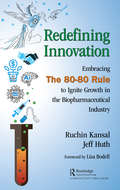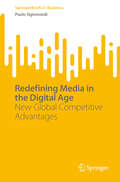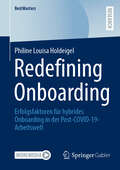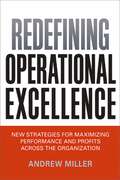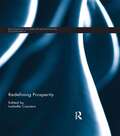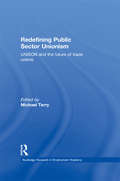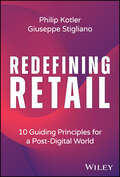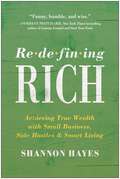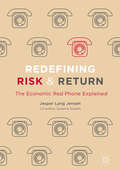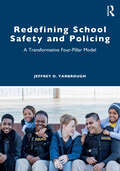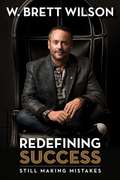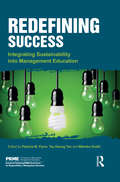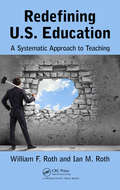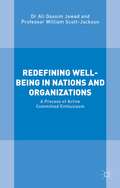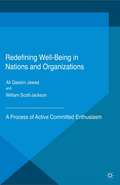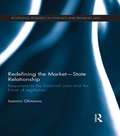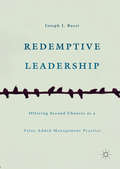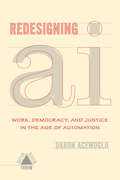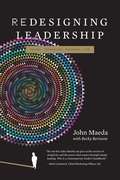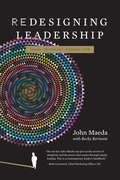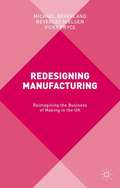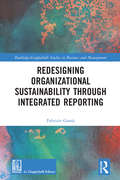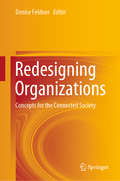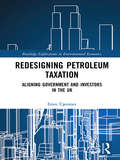- Table View
- List View
Redefining Innovation: Embracing the 80-80 Rule to Ignite Growth in the Biopharmaceutical Industry
by Ruchin Kansal Jeff HuthMost people marvel at the level of innovation demonstrated by the biopharmaceutical industry in bringing new products to the market – especially in the past 20 years. However, there is a crisis looming in the industry that should be a concern to all of us who take for granted the constant pace at which new treatments, and increasingly cures, have emerged from the laboratories of current sector incumbents. In the book, we examine the evolution of the biopharmaceutical industry to understand how it became what we term a "unicorn industry" with a unique, US-centered business model that has led to multiple blockbuster products (aka, unicorns) year after year. We explore how past success has created perceived barriers to innovation diversification beyond the chemical or biological-based biopharmaceutical product, and highlight the warning signs of the industry’s decline. We define a potential pathway for transforming the industry’s business model by broadening the definition, sources, and enablers of innovation beyond the traditional biopharmaceutical product. We introduce and advocate for the 80-80 Rule - "Being 80% confident that you will only be 80% right the first time should feel normal." The 80-80 Rule is a theme that emphasizes speed and willingness to embrace uncertainty and overcome internal barriers to change. It sets the standard for redefining innovation as a platform to reignite growth of the biopharmaceutical industry.
Redefining Media in the Digital Age: New Global Competitive Advantages (SpringerBriefs in Business)
by Paolo SigismondiThe global rise of streaming and social media platforms, and the influence of tech giants in increasingly more sectors of the economy including the media industry, have disrupted the status quo of the global media competitive landscape. This volume offers an insightful analysis of the profound changes in the competitive advantages in the media industry ushered in by digital convergence, and their ramifications. As Hollywood enters its second century, it faces novel challenges stemming from the digital revolution, which are greater, in magnitude and in impact, than any of those brought in by previous communication technology revolutions in the last century. These new challenges include the ascent of new competitors, leading conglomerates arising from the digital revolution, which as a result of the ever-expanding reach of digital convergence are successfully operating in the media sector as well. The new competitive dynamics are on display in the analysis of the streaming and social media landscapes. This book sheds light on the clash of two institutional logics within the new attention economy and its consequences on the competitive landscape. The legacy media institutional logics, represented by the legacy media conglomerates revolving around the Hollywood studios, which have established their primacy in the global mediascape for decades, now directly compete in the new landscape shaped by digital convergence with the digital media institutional logics identifying the tech giants emerging victorious from the digital revolution. The analysis utilizes the dichotomy between scripted and non-scripted media entertainment as a framework to assess the diverse competitive landscapes, business dynamics and their implications, of the different segments shaping the contours and boundaries of the media industry.
Redefining Onboarding: Erfolgsfaktoren für hybrides Onboarding in der Post-COVID-19-Arbeitswelt (BestMasters)
by Philine Louisa HoldeigelDer Übergang zu hybriden Arbeitsumgebungen aufgrund der Digitalisierung und der COVID-19- Pandemie führt zu Herausforderungen beim Onboarding neuer Mitarbeiter. Das veränderte Arbeitsumfeld nach Ende der Pandemie sowie der War for Talents verlangen von Unternehmen die Anpassung bestehender Prozesse, um neue Mitarbeiter ab Unternehmenseintritt erfolgreich und langfristig zu binden. Die Autorin identifiziert Herausforderungen und Erfolgsfaktoren für hybrides Onboarding von Wissensarbeitern, um Anpassungen des Onboardings an den hybriden Onboardingkontext zu optimieren. Die Ergebnisse von Experteninterviews deuten darauf hin, dass sich Erfolgsfaktoren für hybrides Onboarding in fünf Bereiche strukturieren lassen, die sich in der Literatur wiederfinden: Compliance, Clarification, Culture, Connection und Process. Dabei sind speziell für den hybriden Onboardingkontext die Herausforderungen Technik und soziale Distanz gültig und folglich diejenigen Faktoren für das hybride Onboarding relevant, welche die Herausforderungen bewältigen: Den persönlichen Kontakt vor Ort nutzen, digitale Lösungen, insbesondere für die fachliche Einarbeitung integrieren und die Kombination der Arbeitsorte flexibel einsetzen. Die Arbeit attestiert dynamische Weiterentwicklungen für hybrides Onboarding in der Zukunft.
Redefining Operational Excellence: New Strategies for Maximixing Perforamnce and Profits Across the Organization
by Andrew MillerThe old definition of operational excellence is a relic. Our world is too complex, too interconnected, and too fast-moving for organizations to achieve dramatic results simply by eliminating waste and increasing standardization. After all, no company ever cut their way to sustainable growth. True operational excellence is not about "lean" or six sigma or any other methodology. Operational excellence is a mindset, and it achieves breakthrough results. It requires a company culture that questions current models and focuses on adding value, making improvements, and increasing speed. Operational excellence is about finding money and performance boosts in areas businesses don't normally look. Redefining Operational Excellence covers it all--processes, people, and operations--and shares specific strategies to: Drive innovation and collaboration Engage customers Attract and retain top people Align strategy and execution Optimize speed And more Operational excellence is the relentless pursuit of doing things better. This revelatory guide presents a groundbreaking way of doing things that will benefit organizations and their customers.
Redefining Prosperity (Routledge Studies in Ecological Economics)
by Isabelle CassiersSociety today faces a difficult contradiction: we know exactly how the physical limits of our planet are being reached and exactly why we cannot go on as we have before – and yet, collectively, we seem unable to reach crucial decisions for our future in a timely way. This book argues that our definition of prosperity, which we have long assimilated with the idea of material wealth, may be preventing us from imagining a future that meets essential human aspirations without straining our planet to the breaking point. In other words, redefining prosperity is a necessary and urgent task. This book is the fruit of a long debate among 15 scholars from diverse fields who worked together to bring the depth and nuance of their respective fields to questions that affect us all. The result is a rich, transdisciplinary work that illuminates the philosophical and historical origins of our current definition of prosperity; identifies the complex processes that gave rise to the problems we face today; elucidates the ways in which our contemporary environmental, social, nutritional, economic, political, and cultural crises are interconnected; and explores why a half-century of economic growth has neither increased life satisfaction in the West nor vanquished world poverty. Approaching these broad-ranging questions from the specific standpoints of their disciplines, each of the authors offers thoughts for the future, considering possible escape routes and proposing changes to the way we live, behave, and organise society and public action – changes that actually respond, in an equitable way, to our deepest aspirations. Ultimately, in laying the groundwork for a public debate on this subject, this book poses a question to its readers: what is your definition of prosperity, and what can be done to promote it?
Redefining Public Sector Unionism: UNISON and the Future of Trade Unions (Routledge Research in Employment Relations)
by Michael TerryThis book brings together contributions from both expert academics and leading figures of UNISON in an in-depth analysis of the union's achievements to date. As the largest and most influential trade union in the public sector, UNISON is an ideal case-study for the possible future development of UK unions in the twenty first century.
Redefining Retail: 10 Guiding Principles for a Post-Digital World
by Philip Kotler Giuseppe StiglianoDiscover the new realities of working in the post-digital era of consumer brand and retail marketing. In Redefining Retail: 10 Guiding Principles for a Post-Digital World, renowned international marketers Prof. Philip Kotler and Dr. Giuseppe Stigliano deliver a timely and insightful examination of retail and consumer brand marketing. In the book, you’ll find practical and concrete techniques for redefining your organisation’s internal operations and processes, as well as its business strategy. You’ll rethink the entire value chain as you consider the growing importance of sustainability, diversity and inclusion, working policies, and more. The authors describe ten critical principles that should guide the actions of your company, whether you work with a startup, an SME, or a large, established organization. They also discuss: The main challenges retailers face in a world that’s been fundamentally transformed by the digital revolution. How to future-proof your marketing strategy, including 10 guiding principles for a new customer experience at retailers and consumer brands. The opportunities and threats of creating a seamless customer journey in the physical, digital, and virtual realms. Perfect for managers, entrepreneurs, consultants, and investors in both the B2B and B2C sectors, Redefining Retail: 10 Guiding Principles for a Post-Digital World will also prove invaluable to students of management, marketing and business administration, as well as anyone with an interest in the evolution of commerce.
Redefining Rich: Achieving True Wealth with Small Business, Side Hustles, and Smart Living
by Shannon Hayes2022 NATIONAL INDIE EXCELLENCE AWARD FINALIST — BUSINESS, ENTREPRENEURSHIP, & SMALL BUSINESS 2022 AXIOM BOOK AWARD BRONZE MEDALIST — ENTREPRENEURSHIP/SMALL BUSINESS NAUTILUS BOOK AWARD SILVER WINNER — BUSINESS & LEADERSHIP &“Redefining Rich is inspiring, thought-provoking, and highly recommended both as a fascinating story in its own right and as a call to reconsider what one truly aspires to in life.&” —Midwest Book Review In our dysfunctional economy, &“success&” often comes at great personal cost . . . we&’re tired, we&’re stressed out, and we have no time for family and friends. It&’s time to redefine &“rich.&” From a third-generation farmer and successful entrepreneur, Redefining Rich is an entrepreneur&’s guide to balancing work and family with the pleasures of the good life, with simple exercises and important lessons to serve everyone from the new sole proprietor to a seasoned CEO. Shannon Hayes was in the final months of her PhD program, recently engaged, and beginning to plan her future. Having grown up on a northern Appalachian sheep farm, she had two advantages: a hard-won education and hillbilly pragmatism. But when it came time to enter the job market, Hayes made a tough discovery: the economy just doesn&’t work. It doesn&’t work for women, for free thinkers, for the working class, or for white-collar professionals. It doesn&’t work in rural America, much less in the cities and the suburbs. It forces us to choose between career and family, profit and creativity. So, Hayes and her husband walked away from their career paths and chose to forge a life on her family&’s frost-plagued mountain farm, starting up a small café in town. Together, they found their sweet spot: a place where the Appalachian farm culture and sensibilities she and her community have lived by helped them thrive, even in a tough economic environment. Against the odds, the Hayes family built a business that lets them live abundantly, spend time with family, and enjoy the gifts of nature. And the business even helped reinvigorate their chronically economically depressed town. But the journey to this point was rife with challenges, tumbles, and mistakes. With humor, lively stories, and assurance, Hayes reveals the best lessons she&’s learned for taking an alternate path, whether it lies in rural America, in the &‘burbs, or the heart of the city. She outlines the fundamentals of sustainable wealth, how to develop income streams, get organized, bring family into the business, ask for fair prices and market efficiently, and—the most important lesson of all—set personal boundaries and say &“no&” even while sustaining relationships. Hayes shows entrepreneurship is the means to build sustainable communities, keep families together, and foster great creative fulfillment. Redefining Rich will comfort, instruct, amuse, and inspire those of us who are trying to make our lives work in untraditional ways.
Redefining Risk & Return
by Jesper Lyng Jensen Susanne SublettThis book is the first attempt to re-define objective risk. It addresses the cost of running out of capital as a generalized cost syndrome and explains how it is possible to describe this cost in such a way as to give it practical, real-life significance for personal finances, company finances and the economy as a whole. The discussion begins by presenting an intuitive and useful definition of risk: the probability of prospective capital shortfall. From this point it establishes a risk theory and expands the work of major thinkers such as Frank Knight and John Maynard Keynes, and adds reserve capital as a new financial risk management tool, with an economic function that is different from savings. This book will be of interest to economists, politicians, and decision makers as well as to the general public.
Redefining School Safety and Policing: A Transformative Four-Pillar Model
by Jeffrey D. YarbroughRedefining School Safety and Policing identifies and works to eliminate systemic issues in school policing that negatively impact students of color, LGBTQIA+ students, and other marginalized populations. Focusing on the fundamental goal of creating safe learning environments, Yarbrough lays out the unintended consequences of involving police in the administrative disciplinary process, as agents of school administrators and enforcers of zero-tolerance policies. Behavioral health support is important to students going through social, emotional, and mental health crises. True equity work brings everyone to a safe space in the middle, encouraging open discussion and courageous dialogue and aiming to create positive change. Yarbrough argues that behavioral health and racial equity are vital to transforming school policing and providing beneficial alternative solutions to school policing that do not lead students to the juvenile or criminal justice system. This book is suitable for colleges and universities, K-12 school administrators, teachers, police and school resource officers, counselors, social workers, and community activists.
Redefining Success
by W Brett WilsonW. Brett Wilson, Dragons' Den co-star and Risky Business host, often gets asked about his secrets to success. He became one of Canada's top investment bankers because he was driven, willing to take risks and saw opportunity where others saw roadblocks. But along the path to business success, he tripped over a multitude of misguided priorities. For many years, Wilson pursued business with uncompromising focus, working long hours, seven days a week. In the process, his marriage and his health suffered greatly: he was rarely home as his children were growing up, divorce became inevitable and cancer struck at age forty-three. He truly learned the hard way that one can find financial success and the respect of business peers while almost losing what matters most: health, family and friends. Redefining Success details how Wilson was forced to redefine his life, making health and key relationships his first priorities. Through trial and error, he discovered that these simple virtues are foundational for real, enduring success, both in business and in life. Wilson's compelling insights are the basis for Redefining Success. Not just for entrepreneurs and business people, the book outlines how we can change our lives for the better by re-evaluating our personal definitions of success, then reworking them into a life plan that is feasible, lasting and rewarding. Inspirational and paradigm-changing, Redefining Success will help you implement and sustain lasting, positive change in your life--and make your world a little more meaningful--everyday.
Redefining Success
by W. Brett WilsonW. Brett Wilson, Dragons' Den co-star and Risky Business host, often gets asked about his secrets to success. He became one of Canada's top investment bankers because he was driven, willing to take risks and saw opportunity where others saw roadblocks. But along the path to business success, he tripped over a multitude of misguided priorities. For many years, Wilson pursued business with uncompromising focus, working long hours, seven days a week. In the process, his marriage and his health suffered greatly: he was rarely home as his children were growing up, divorce became inevitable and cancer struck at age forty-three. He truly learned the hard way that one can find financial success and the respect of business peers while almost losing what matters most: health, family and friends.
Redefining Success: Integrating Sustainability into Management Education (The Principles for Responsible Management Education Series)
by Patricia M. Flynn Tay Keong Tan Milenko GudićRedefining Success: Integrating Sustainability into Management Education advocates incorporating sustainability concepts that go beyond the financial ‘bottom line’ into management education and business practice. Highlighting the UN Global Compact (UNGC), the Principles for Responsible Management Education (PRME) and the Sustainability Development Goals (SDGs), it explores conceptual and practical issues, presents case studies and other empirical evidence, and offers solutions that will both encourage and assist management educators in the incorporation of sustainability into their courses and research. incorporating sustainability into their courses and research. Written by 34 individuals from 17 countries, the book addresses these topics from a variety of theoretical, disciplinary, geographic and organizational perspectives. The authors demonstrate how management educators, collaborating with business and civic organizations, can be change agents for a better world. Written for educators, scholars and business practitioners, the volume concludes with lessons learned, challenges encountered, and implications for responsible management education.
Redefining U.S. Education: A Systematic Approach to Teaching
by William F. Roth Ian M. RothA growing number of educators are beginning to believe that as we move into a different kind of world with different possibilities, the traditional approach to teaching is no longer the most productive. They are beginning to understand that if we are to continue progressing as a nation, we need to place more emphasis on the development of each stud
Redefining Well-Being in Nations and Organizations: A Process of Active Committed Enthusiasm
by Ali Qassim Jawad William Scott-JacksonRedefining Well-Being in Nations and Organizations.
Redefining Well-Being in Nations and Organizations: A Process of Improvement
by William Scott-Jackson Ali Qassim JawadRedefining Well-Being in Nations and Organizations is an essential book for researchers, policy makers and managers. It provides a new multi-disciplinary perspective on wellbeing and engagement, reviewing the latest research from several previously unrelated disciplines to develop a process for active committed enthusiasm (PACE), encompassing theory and clarifying the definitions of, and relationships between, wellbeing, engagement and related concepts. PACE allows researchers to model causal relationships, and policy makers and managers to analyze the potential impact of possible interventions. It demonstrates that, as nations, organizations and individuals fulfil their basic material needs, the impact of individual optimism, and other aspects of positive psychology, become paramount in maximizing wellbeing and engagement.
Redefining the Market-State Relationship: Responses to the Financial Crisis and the Future of Regulation (Routledge Research in Finance and Banking Law)
by Ioannis GlinavosThis book offers an interdisciplinary overview of the role of law in modern capitalism in the context of financial crisis. In this work, the reader will find a discussion of key issues relevant to the crisis that have occupied the pages of the financial press since 2007 including an assessment of the meltdown of the sub-prime mortgage market, the credit crunch, the European debt crisis and the turmoil in Greece, plus a series of theoretical contributions that are aimed to challenge perceptions of the market-state relationship and the place of law within it. The book includes a methodological defence of the state-market dichotomy, a critique of the tenets of neoclassical economics, and an evaluation of what the financial crisis heralds for the future of the political economy of western democracies. Ioannis Glinavos argues that it is a mistake to associate markets with freedom and states with oppression, and suggests that more choice for consumers can -and does- mean less choice for citizens. The book suggests that a new social contract is needed to ensure the survival of both capitalism and democracy. In contributing a unique, legal perspective to the underlying dynamics of the financial crisis, this book will be valuable to scholars and students of regulation, financial markets and economic development.
Redemptive Leadership
by Joseph J. BucciThis book outlines skills and behaviors for managers to adopt when offering second chance opportunities, providing the resources needed to reclaim, restore, and redirect current employees with great potential but who demonstrate terminal conduct. Based on qualitative research, it analyses incidents of successful reinstatement and improved performance by employees previously discharged for cause, citing cases that highlight the benefits of choosing to offer redemption and give employees second chances. Organizational pressure to hire and retain near-perfect employees is higher than ever, yet little research has been conducted assessing the impact of the manager's leadership behavior. This book fills that gap and provides seminal reading for faith-oriented students, scholars, managers, and human resources professionals, particularly focused on religious and secular leadership, to help foster a nurturing and redemptive environment.
Redesigning AI (Boston Review / Forum)
by Daron AcemogluA look at how new technologies can be put to use in the creation of a more just society.Artificial Intelligence (AI) is not likely to make humans redundant. Nor will it create superintelligence anytime soon. But it will make huge advances in the next two decades, revolutionize medicine, entertainment, and transport, transform jobs and markets, and vastly increase the amount of information that governments and companies have about individuals. AI for Good leads off with economist and best-selling author Daron Acemoglu, who argues that there are reasons to be concerned about these developments. AI research today pays too much attention to the technological hurtles ahead without enough attention to its disruptive effects on the fabric of society: displacing workers while failing to create new opportunities for them and threatening to undermine democratic governance itself. But the direction of AI development is not preordained. Acemoglu argues for its potential to create shared prosperity and bolster democratic freedoms. But directing it to that task will take great effort: It will require new funding and regulation, new norms and priorities for developers themselves, and regulations over new technologies and their applications.At the intersection of technology and economic justice, this book will bring together experts--economists, legal scholars, policy makers, and developers--to debate these challenges and consider what steps tech companies can do take to ensure the advancement of AI does not further diminish economic prospects of the most vulnerable groups of population.
Redesigning Leadership
by John MaedaWhen designer and computer scientist John Maeda was tapped to be president of the celebrated Rhode Island School of Design in 2008, he had to learn how to be a leader quickly. He had to transform himself from a tenured professor--with a love of argument for argument's sake and the freedom to experiment--into the head of a hierarchical organization. The professor is free to speak his mind against "the man. " The college president is "the man. " Maeda has had to teach himself, through trial and error, about leadership. In Redesigning Leadership, he shares his learning process. Maeda, writing as an artist and designer, a technologist, and a professor, discusses intuition and risk-taking, "transparency," and all the things that a conversation can do that an email can't. In his transition from MIT to RISD he finds that the most effective way to pull people together is not social networking but free food. Leading a team? The best way for a leader to leverage the collective power of a team is to reveal his or her own humanity. Asked if he has stopped designing, Maeda replied (via Twitter) "I'm designing how to talk about/with/for our #RISD community. " Maeda's creative nature makes him a different sort of leader--one who prizes experimentation, honest critique, and learning as you go. With Redesigning Leadership, he uses his experience to reveal a new model of leadership for the next generation of leaders.
Redesigning Leadership (Simplicity: Design, Technology, Business, Life)
by John MaedaLessons for a new generation of leaders on teamwork, meetings, conversations, free food, social media, apologizing, and other topics. When designer and computer scientist John Maeda was tapped to be president of the celebrated Rhode Island School of Design in 2008, he had to learn how to be a leader quickly. He had to transform himself from a tenured professor—with a love of argument for argument's sake and the freedom to experiment—into the head of a hierarchical organization. The professor is free to speak his mind against “the man.” The college president is “the man.” Maeda has had to teach himself, through trial and error, about leadership. In Redesigning Leadership, he shares his learning process. Maeda, writing as an artist and designer, a technologist, and a professor, discusses intuition and risk-taking, “transparency,” and all the things that a conversation can do that an email can't. In his transition from MIT to RISD he finds that the most effective way to pull people together is not social networking but free food. Leading a team? The best way for a leader to leverage the collective power of a team is to reveal his or her own humanity. Asked if he has stopped designing, Maeda replied (via Twitter) “I'm designing how to talk about/with/for our #RISD community.” Maeda's creative nature makes him a different sort of leader—one who prizes experimentation, honest critique, and learning as you go. With Redesigning Leadership, he uses his experience to reveal a new model of leadership for the next generation of leaders.
Redesigning Manufacturing
by Michael Beverland Beverley Nielsen Vicky PryceManufacturing in the UK has an image problem. Although this image problem is more fiction than fact, it nonetheless has an impact on the sector's ability to attract staff, capital, and policy interest. Redesigning Manufacturing seeks to redress this situation by focusing on the real successes of the sector and the strategies used by makers to achieve sustainable results. In so doing, we broaden the debate about manufacturing to encompass issues of branding, design and creativity, craft, market creation, and supportive ecosystems. Rather than viewing the future of the manufacturing sector as reliant solely on productivity improvements, the pursuit of high technology markets, and investments in science, engineering, technology and maths, this book highlight the connectedness and complexity of modern manufacturing in the UK. Drawing on these insights and the success of many Midlands-based manufacturers the authors explore a more nuanced industrial policy.
Redesigning Organizational Sustainability Through Integrated Reporting (Routledge-Giappichelli Studies in Business and Management)
by Fabrizio GranàThis book explores the role of accounting and reporting practices, such as corporate and integrated reports, as organizations attempt to represent sustainability. By relying upon the case of a large international oil and gas company and its recent development of integrated reporting, this book argues that the ambiguity of sustainability as a concept, and the impossibility to fully capture it through accounting and reporting practices, does not mean that any attempt to represent it inevitably leads to distortion or obfuscates ‘reality’. Rather, the way in which this concept is presented through accounting and reporting practices can have a constructive effect on the organization through the aspirations that these representations entail. The book demonstrates that accounting and reporting practices, such as integrated reporting, are not expected to offer complete representations of organizations’ sustainability. Rather, these practices offer a number of representations (e.g. graphs, diagrams, tables, grid) that affect the way in which organizations understand and report on sustainability, changing its meaning over time. Finally, this study demonstrates that undefined concepts, such as ‘sustainability’, and practices, such as ‘integrated reporting’, mutually construct each other. The attempt to represent sustainability within the organization and the debates that this process generates, make accounting and reporting practices unfold themselves, and evolve. The book will be of interest to scholars in the field of accounting, management and sustainability, as well as practitioners from a wide array of additional fields, such as planning and control, organizations’ strategy, business ethics, corporate social responsibility and corporate reporting.
Redesigning Organizations: Concepts for the Connected Society
by Denise FeldnerThis book offers readers a deeper understanding of the Cyberspace, of how institutions and industries are reinventing themselves, helping them excel in the transition to a fully digitally connected global economy. Though technology plays a key part in this regard, societal acceptance is the most important underlying condition, as it poses pressing challenges that cut across companies, developers, governments and workers. The book explores the challenges and opportunities involved, current and potential future concepts, critical reflections and best practices. It addresses connected societies, new opportunities for governments, the role of trust in digital networks, and future education networks. In turn, a number of representative case studies demonstrate the current state of development in practice.
Redesigning Petroleum Taxation: Aligning Government and Investors in the UK (Routledge Explorations in Environmental Economics)
by Emre ÜşenmezSince its inception some 40 years ago, petroleum-specific taxation in the UK has been subject to numerous modifications. Often these modifications were brought into place not only to sufficiently incentivise the investors but also to capture a fair share for the government. However, it is evident from the frequency of changes that finding the right balance between these two aims is no easy matter. Such a balance, and the consequent fiscal stability, is necessary for the long-term relationship between the parties to endure to their mutual benefit. Still, it does not take much for one or other party to feel that they are out of balance. As a consequence, one party feels that the other party is taking an undue proportion of the value generated and that they are losing out. Yet achieving that balance and fiscal stability is possible. To understand this possibility, this book first clarifies what is meant by sufficient incentivisation and fair share before developing a new fiscal system that manages this balance and stability. Such clarification yields objective criteria against which to assess not only the existing regime, but also the newly proposed regime. This approach is further complemented by the critical analysis of the fiscal legislative framework and the evaluation of the legal positions of specific contractual elements and mechanisms found within that framework. This latter analysis is important in order to reduce the legal uncertainty such elements may create, which can otherwise lead to further reactive amendments and revisions to the fiscal regime in the future.
